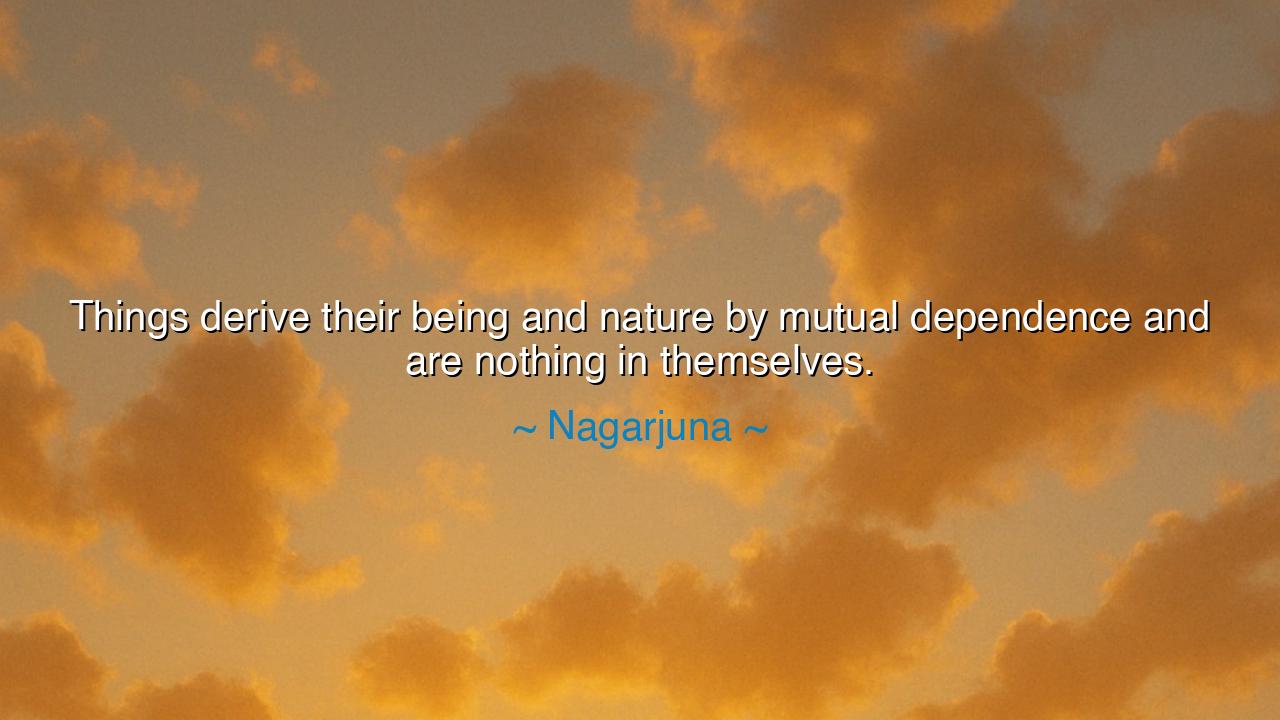
Things derive their being and nature by mutual dependence and
Things derive their being and nature by mutual dependence and are nothing in themselves.






Hear the words of Nagarjuna, the great sage of the Middle Way, who declared: “Things derive their being and nature by mutual dependence and are nothing in themselves.” In this teaching lies the essence of profound wisdom, a truth that humbles the proud and liberates the seeker. For we are taught here that no thing, no being, no moment stands alone. All is interwoven, each thread bound to another, the fabric of existence held not by independence but by mutual dependence. To believe in a thing as separate, as self-sufficient, is to fall into delusion. To see the interconnection of all things is to awaken.
The origin of this saying is found in the Buddha’s teaching of dependent origination: that nothing arises by itself, but only because of countless causes and conditions. The seed becomes the tree because of earth, rain, and sunlight. The flame burns because of oil and wick. Even the self that cries, “I am!” is but a confluence of body, mind, memory, and perception, flowing like a river with no single point of origin. Nagarjuna, in his wisdom, sharpened this truth: because things exist only through dependence, they are empty of inherent, permanent essence.
Consider the story of the silk road, where traders crossed mountains and deserts to exchange goods, ideas, and faiths. A bolt of silk from China, a jewel from India, a manuscript from Greece — each treasure seemed unique, precious in itself. Yet its existence as wealth or knowledge depended on the caravan that bore it, the craftsman who made it, the soil that nurtured it, the hands that passed it along. None of these things had meaning alone. Each derived its being through the web of connections stretching across continents. Without the interdependence of many lives, each object would have been nothing.
This truth is not merely philosophical but practical and urgent. For when man forgets mutual dependence, he clings to the illusion of separateness, and from this illusion springs greed, pride, and conflict. He says, “This is mine, and mine alone,” not seeing the countless hands that shaped what he claims. He says, “I am self-made,” not seeing the family, the teachers, the soil, the society that allowed him to grow. He says, “That person is other, not me,” not seeing that his life is bound to theirs as the body is bound to breath. Thus delusion blinds him, and suffering multiplies.
But when the eyes are opened to emptiness, there comes freedom. To see that things are empty of separate selfhood is not to say they do not exist, but to say they exist more wondrously, as shimmering reflections of the whole. The mountain is not just stone, but rain and wind, time and fire. The child is not just a single being, but the sum of ancestors, of earth and sky, of all who have loved and shaped them. In this way, emptiness is fullness: all is connected, all is alive in the great web of becoming.
The lesson for us is clear: live not as one who clings to separateness, but as one who honors connection. Know that every word you speak, every act you take, ripples outward into the great fabric of life. To harm another is to harm yourself; to heal another is to heal yourself. This is not poetry but truth, for your being itself derives from others — as breath from air, as light from sun, as knowledge from teachers. The wise person, seeing this, cultivates compassion, for compassion is simply the recognition of interdependence.
Therefore, take these practical actions: Each day, pause to remember those upon whom your life depends — the farmer who raised your food, the worker who built your shelter, the earth that sustains your every breath. Live with gratitude, for gratitude is the heart’s recognition of dependence. Practice compassion, for compassion is the natural fruit of seeing yourself in others. And when pride whispers that you are separate, recall Nagarjuna’s words: you are not an island, but a wave in the vast ocean of existence.
So remember, children of wisdom: things derive their being by mutual dependence and are nothing in themselves. This is not a cause for despair but for wonder, for it means you are not alone, you are not isolated, but forever bound in the sacred dance of all things. To know this is to walk the Middle Way — humble, free, and filled with love.






AAdministratorAdministrator
Welcome, honored guests. Please leave a comment, we will respond soon